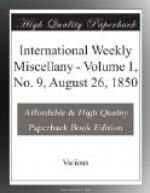Proceeding nominally on the basis of the Koran, it inculcates or expounds a kind of spiritual transcendentalism; in which the adept is raised above the necessity of formal laws, which are only requisite for those who are not capable of rising to a full intelligence of the supreme power. To gain this height, by devout contemplation, must be the personal work and endeavor of each individual. The revelation of divine truth, once attained, supersedes specific moral injunctions; ceremonies and systems, even, of religion, become indifferent to the mind illuminated by the sacred idea. A higher degree is the perfect conception or ecstatic vision of the Deity;—the highest-reserved only for the prophetic few—a real immediate union with his essence. Here, it will be seen, are four steps or stages, each of which has its sacred manual or appropriate system of teaching. In the hieratic system, of which Schamyl is the head, the divisions seem to correspond pretty nearly with this arrangement, as follows:—
The first includes the mass of the armed people; whose zeal it promotes by strict religious and moral injunctions enjoining purity of life, exact regard to the ritual of the Koran, teaching pilgrimages, fasting, ablutions; the duty of implacable war against the Infidel, the sin of enduring his tyranny.
The second is composed of those, who, in virtue of striving upward to a higher Divine intelligence, are elevated above ceremonial religion. Of these the Murids (seekers or strugglers,) are formed: a body of religious warriors attached to the Imam, whose courage in battle, raised to a kind of frenzy, despises numbers and laughs at death. To accept quarter, or to fly from the Infidel, is forbidden to this class.
The third includes the more perfect acolytes, who are presumed to have risen to the ecstatic view of the Deity. These are the elect, whom the Imam makes Naibs or vice-regents,—invested with nearly absolute power in his absence.
The fourth, or highest, implying entire union with the Divine essence, is held by Schamyl alone. In virtue of this elevation and spiritual endowment, the Imam, as an immediate organ of the Supreme Will, is himself the source of all law to his followers, unerring, impeccable; to question or disobey his behests is a sin against religion, as well as a political crime. It may be seen what advantage this system must have given to Schamyl in his conflict with the Russians. The doctrine of the indifference of sects and forms enabled him to unite the divided followers of Omar and of Ali, in a region where both abound, and where the schism had formerly been one of the most effectual instruments of the enemy. The belief in a Divine mission and spiritual powers sustains his adherents in all reverses; while it invites to defection from the Russian side those of the Mohammedan tribes who have submitted to the invader. Among




